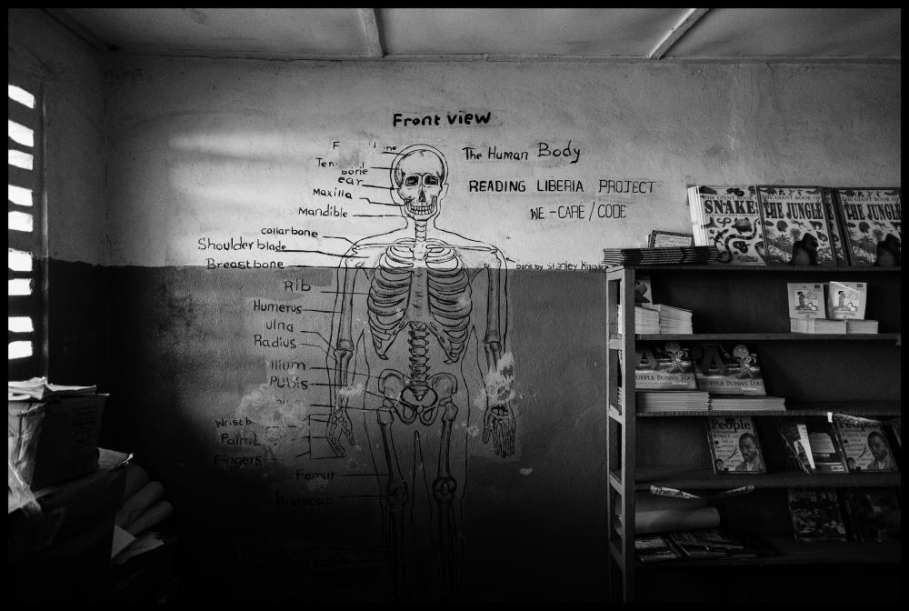

The books in this science classroom are supplied by CODE, a Canadian NGO that has for 50 years been supporting teacher training, literacy improvement, and the teaching of critical thinking in developing nations, and by the International Book Bank, which supplies culturally and educationally appropriate books to schools in developing nations.
Liberian Schools in Black and White
Photographer: B. D. Colen
Exhibit Title: Liberian Schools in Black and White
Location: Liberia
A decade after Liberia's civil wars ended, the nation still has an unemployment rate as high as 85 percent, 80 percent of the population lives in poverty, the nation’s power grid has yet to be rebuilt, and about 40 percent of Liberians are illiterate.
As these images, made in Liberian schools in January 2014, attest, despite all the barriers they have to overcome, Liberias boys and girls, young women and young men, seem to understand that learning and literacy are the foundation upon which all other forms of personal and national progress are built.
But the progress being made has been threatened by the Ebola epidemic now sweeping Liberia: The schools are closed for the foreseeable future, children are trapped in their homes, and they desperately need your help.
The Internatioonal Book Bank is raising funds to ship free books to Liberia's students, so that they can continue to keep up their reading levels. To find out more, and help, please click on this link and donate today.
This work would not have been possible without support from CODE, the International Book Bank, the We-Care Foundation and Reading Liberia, CODE, IBB, and We-Care are supporting the improvement of public education in Liberia through the provision of books and advanced teacher training.
In January, 2014, I spent two weeks in post-civil war Liberia documenting the work of two literacy focused international NGOs.
What groups such as the Gates Foundation and Doctors Without Borders do to improve public health and medical care in developing nations, CODE, a 50-year-old Canadian organization, and the International Book Bank, of Baltimore, MD., do to improve the education of children in developing nations such as Liberia.
CODE volunteers, many of whom are professors of education and teachers in the U.S. and Canada, work to advance literacy and the teaching of critical thinking, providing training and support for teachers in Liberia and other countries, and working with local organizations to ensure that the programs will continue when CODE's work is finished.
The International Book Bank has thus far supplied more than 25 million books to schools in Africa, areas of the former Soviet Union, and Latin America. The IBB also suports the writing and publication of culturally appropriate school books by local organizations - in Liberia IBB and CODE work closely with the Liberian We-Care Foundation and its Reading Liberia program.
Together, through long-standing partnerships, CODE, IBB, and We-Care are working to improve the quality of education afforded the children of Liberia.
As I hope you will learn from these images, the physical state of the schools of Liberia may be deplorable, but Liberia's children are taking their education seriously, understanding that it is the key to their future and the future of their nation.
B. D. Colen
Email - bd@bdcolenphoto.com
Web - bdcolenphoto.com
Tumblr - bdcolen.tumblr.com
Twitter - @TheBDColen
Cell - 627-413-1224
B. D. Colen is a Pulitzer Prize-winning former reporter, editor, and columnist who spent 26 years at The Washington Post and Newsday, covering medicine, health care, and health policy for 17 of those years. A photographer for more than 50 years, Colen began his professional photography career in 1963, covering the historic March on Washington for Jobs and Freedom for a weekly newspaper in Connecticut.
For the past 14 years Colen has taught documentary photography and journalism writing courses at The Massachusetts Institute of Technology (MIT), and has taught photography at the Maine Media Workshops and the Harvard University Extension School.
His work has appeared in publications from Newsday, to the New England Journal of Medicine, from the Boston Globe, to the Christian Science Monitor, and he has photographed for numerous corporate and institutional clients.
B. D. Colen is available for international and national documentary work for NGOs, editorial clients, and private individuals.
Make Comment/View Comments